Assessing mandated organization capacity to implement eco-innovation strategies in the Garden Route, South Africa
Student: Samantha Mc Culloch
Promotor/s: Prof. Christo Fabricius and Dr. Dirk Roux
Study Area: Garden Route, Western Cape
Duration: 2013 – 2014
Funding: Water Research Commission and National Research Foundation Scarce-Skills Scholarship
Media and communication influences on farmers' views of water conservation in the Garden Route, South Africa
Student: Thea Buckle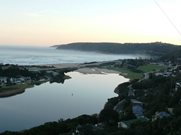
Promotor/s: Prof. Christo Fabricius and Dr. Janina Wozniak
Study Area: Garden Route, Western Cape
Duration: 2014 - 2015
Funding: Water Research Commission; Nelson Mandela University PGRS
A case study of human-baboon co-habitation on NMMU George Campus, South Africa
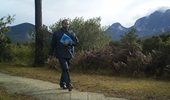 Student: Peet Botes
Student: Peet Botes
Promotor/s: Dr. Corli Coetsee and Prof. Christo Fabricius
Study Area: Nelson Mandela University George Campus
Duration: 2013 - 2014
Plant survival in relation to microcatchments in a Nama-Karoo riparian ecosystem restoration trial
Student: Andrew Jackson
Promotor/s: Dr. Ben Wigley and Dr. Sue Milton-Dean
Study Area: Sakrivierspoort Farm , Loxton, Northern Cape
Duration: 2013 - 2014
Funding: Endangered Wildlife Trust, Nelson Mandela University Faculty of Science and Fairfield
Influence of stakeholder identities on benefit sharing related to use of the Wilderness and Swartvlei lake systems
?width=180&height=120) Student: Aneri Vlok
Student: Aneri Vlok
Promotor/s: Prof Janine Adams & Dr Dirk Roux
Duration: 2012 – 2013
Study Area: Wilderness and Swartvlei Lakes
Funding: Water Research Commission
Determining the extent to which ecological infrastructure is considered during the process of planning and development in the Eden Coastal District
Student: Abigail Crisp 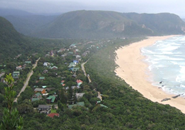
Promotor/s: Prof. Christo Fabricius and Dr. Dirk Roux
Study Area: Garden Route, Western Cape
Duration: 2013 – 2014
Funding: National Research Foundation Innovation Scholarship
Exploring Different Approaches in the Prioritisation of Protected Areas: A Case Study in the Western Cape of South Africa
To use the conversion process in the Southern Cape to provide a comparison of two differing prioritisation techniques. More specifically, stakeholder-based and quantitative approaches.
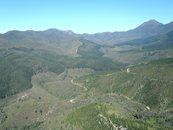 Student: Kate Southey
Student: Kate Southey
Promotor/s: Prof Graham Kerley
Study Area: Garden Route
Duration: 2013 - 2014
Funding: Faculty of Science, Sustainability Research Unit and Zoology Department
Historic trends in recreational angling catches reported in local newspapers (1940–2012)
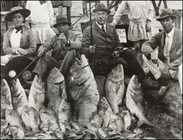
Collaborators: Jaco Barendse, Kyle Smith (SANParks), Stefan Oosthuizen, Duane Roberts
Project Objectives:
-
Identify the major ‘trophy’ fish species in the Garden Route region from articles and photographs in the local press;
-
Identify any trends in reporting of the species, frequency, and size;
-
Relate this to known trends in stock status and possible perceptions about historic baselines.
Various aspects relating to the Sustainable Seafood in South Africa
Collaborators: Jaco Barendse, SANBI, WWF
Project Objectives: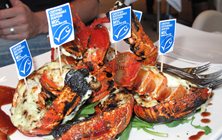
-
Document and examine the development of the Sustainable Seafood Movement (Sustainable Seafood Initiatives and fishery Eco-labels) over the past decade in South Africa;
-
Develop commentary and guidelines on seafood trade names and labelling practise in the local seafood market
-
Examine the impacts of certain policies on trawl bycatch management and the influence this may have on legal seafood trade
Molecular analyses of two indigenous estuarine fish species in an isolated coastal lake: implications for the management of exotic ichthyofauna
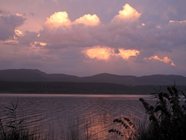 Collaborators: Nikki Gartrell and Sophie von der Heyden (Stellenbosch University), Jaco Barendse, Kyle Smith (SANParks)
Collaborators: Nikki Gartrell and Sophie von der Heyden (Stellenbosch University), Jaco Barendse, Kyle Smith (SANParks)
Project Objectives:
-
Using mtDNA markers we evaluate the conservation importance of isolated populations of the only two native fish species of Groenvlei, Cape silverside and estuarine round herring
-
This should inform ongoing management interventions to control alien invasive fish, especially common carp, in Groenvlei
Enhancing water security practices in the eastern and southern Cape, South Africa
Project Participants: Nelson Mandela University George Sustainability Research Unit, Rhodes University, University of Fort Hare
Study Area: Eden District Municipality
Project Duration: 2012 – 2014
Funding: National Research Foundation and Department of Science and Technology
Project Objectives:
-
What is the condition and meaning of “water security” in the designated social-ecological system (two case study sites) at multiple spatial and temporal scales?
-
How can water security (and water security practices) be enhanced in designated social-ecological systems (two case study sites) at multiple spatial and temporal scales?
-
How can the gap between theory and management be reduced to increase human and ecological well-being in the designated catchments?
Invasive alien vegetation management, resilience and strategic adaptive management in South African National Parks
Student: Wynand Loftus
Supervisor: Prof Christo Fabricius
Duration: 2012 – 2013
Study Area: SANParks; experts in alien vegetation research
Funding: National Research Foundation
Learning and reflection for adaptive co-management of ecosystems
Study Area: Eden District Municipality
Project Participants: Nelson Mandela University George Sustainability Research Unit
Duration: 2011 – 2014
Funding: National Research Foundation
Project Objectives:
-
Develop the capacity for adaptive co-management of stakeholders in the Working for Water and Working for Wetlands projects through facilitated social learning processes, monitoring them and adapting them to fit the southern Cape context.
-
Document the strengths and weaknesses of various social learning activities and processes, using participatory learning and action approaches.
-
Facilitate the application and uptake of this knowledge to improve adaptive co-management of ecosystem services through decision-making tools, manuals, web sites and other instruments to promote social learning in the context of ecosystem repair.
-
Contribute to theory and practice of community engagement, by coupling theoretical principles of adaptive co-management and social learning with practical ecosystem management interventions.
Southern African Program on Ecosystem Change and Society (SAPECS)
Project Participants: Nelson Mandela University George Sustainability Research Unit; Council for Scientific and Industrial Research; University of Stellenbosch; Rhodes University; various other South African universities; Stockholm Resilience Centre
Study Area: Southern Africa
Duration: On-going
Link: www.sapecs.org
Project Objectives:
-
Developing a collaborative regional research program around social-ecological and ecosystem service research in Southern Africa, and
-
Strengthening and building a community of practice in this field.
When adaptation isn’t enough: transformations towards earth stewardship in social-ecological systems
Project participants: Nelson Mandela University George Sustainability Research Unit
Funding: Nelson Mandela University
Study Area: Western Cape
Duration: On-going
Funder: Nelson Mandela University
Project Objectives:
-
Merely developing the capacity to adapt and return to a former state is an inappropriate response in the Anthropocene, particularly in sub-Saharan Africa.
-
We argue for a better understanding of the variables and processes that characterize transformation, i.e. a radical shift in the way problems are being perceived and responded to.
-
The project is characterized by trans-disciplinarity, adopting a multi-scale approach, using global comparisons and adopting a complex, social-ecological systems 'lens'.
Environmental stewardship in South Africa
Collaborators: Jaco Barendse, Christo Fabricius, Dirk Roux, Bianca Currie
Project Objectives:
-
Review the application of the term and concept of environmental stewardship as an approach to further conservation outcomes and sustainable natural resource management.
Social Learning for public participation in environmental management in the Knysna Municipality, South Africa
Student: Bianca Currie
Promotor: Prof Christo Fabricius
Study Area: Knysna, South Africa
Funding: National Research Foundation